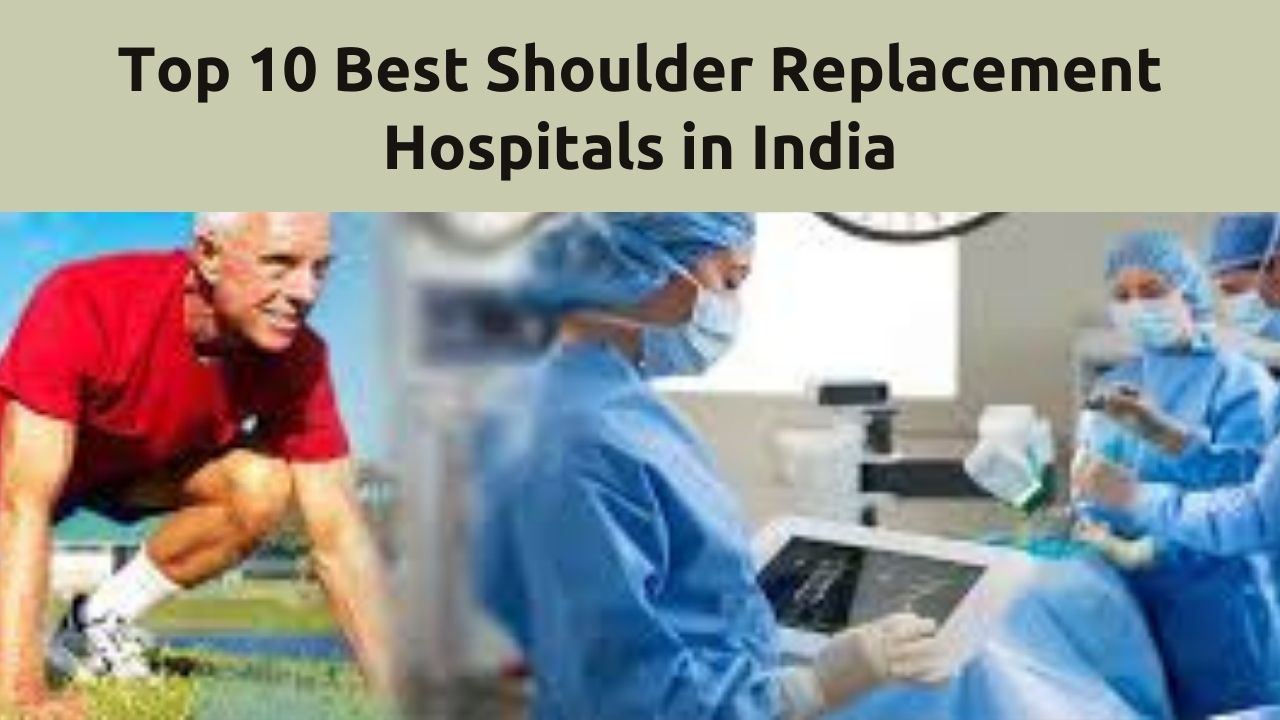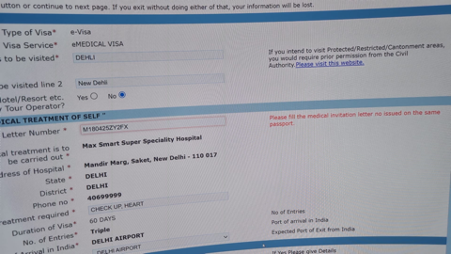
A total shoulder replacement becomes necessary when the shoulder’s range and mobility are affected due to normal wear and tear. In some instances, the individual may also experience pain in the shoulder region. Total shoulder replacement involves the removal of the shoulder joint and replacing it with artificial implants to restore the shoulder’s functionality while eliminating any pain.
Your upper arm connects to your body via a ball-and-socket joint. The bone in the upper arm which goes by the name of humerus, has a rounded ball-shaped end that slots into the curved socket found on the outside of your shoulder blade. Any damage to the joint can result in experiencing pain, weakness and stiffness.
By way of treatment options available, either the ball or both the ball and socket can be replaced.
You may have to consider having the shoulder replaced if any of the following conditions occur:
- Arthritis of the shoulder joint: The most common reason to consider a shoulder replacement surgery is when a person is affected by arthritis of the shoulder, notably when nonsurgical options have failed to have the desired effect. Arthritis of the shoulder causes pain and is usually accompanied by progressive stiffness along with a grinding sensation in the shoulder.
When these symptoms appear, it means that the bones that are part of the ball and socket of the shoulder joint are grinding against each other as the cartilage present between them has worn out.
As a first step, the doctor may opt for anti-inflammatory drugs. Should they not have the desired results in terms of pain relief or increased mobility, you may need to go in for a total shoulder replacement.
- Fracture: A shoulder fracture is one of the common reasons to resort to a shoulder replacement. An acute injury to the upper arm’s head will likely complicate the doctor’s efforts to treat the fracture. Depending on the condition of the socket, the doctor may opt for either a partial of total shoulder replacement to mend the fracture and stabilize the joint.
- Rotator Cuff tear: A rotator cuff tear occurs when the patient injures any of the muscles lining the humerus. These muscles play an essential role in maintaining the stability of the shoulder. If the rotator cuff tear is not addressed, it could lead to arthritis, thus requiring surgery to replace the offending shoulder.
- Rheumatoid Arthritis: Rheumatoid arthritis is an autoimmune disorder that occurs when your immune system mistakenly attacks the healthy cells, specifically the ones found in the joints. Unlike osteoarthritis, which is the result of normal wear and tear, rheumatoid arthritis causes inflammation of the joints that eventually result in bone erosion and joint deformity.
Surgically fusing the joint that will realign it or resorting to a total shoulder replacement are two of the options available for patients affected by rheumatoid arthritis.
- Osteonecrosis: The bones, like the rest of the human body, consist of living cells and need a regular supply of blood to stay healthy. Osteonecrosis disrupts blood flow to the bones. The lack of blood supply will eventually wear out the shoulder joint, leading to arthritis. Regular use of steroids and heavy consumption of alcohol increase the risk of osteonecrosis.
Signs that you require shoulder replacement surgery:
- Pain that constantly radiates in the shoulder.
- Sleepless nights.
- Weakness in the arm.
- Pain even though there is no physical activity.
- The ability to lift the arm and reach out for objects is impaired.
Types of Shoulder Replacement
The doctor will decide on the type of shoulder replacement surgery depending on the extent of the damage. After evaluating the condition of the shoulder joints, the doctor may decide to pursue one of the following shoulder replacement options:
- Total shoulder joint replacement: In case of a total shoulder replacement, the ball and socket are replaced with implants. This procedure is usually recommended in case of advanced joint damage.
- Reverse total shoulder replacement: When performing a reverse shoulder replacement, the doctor switches the ball’s position and the socket. The ball is affixed to the shoulder blade and the socket to the humerus. Patients with rotator cuff tears usually are offered this option.
- Partial shoulder replacement: Partial shoulder replacement is a surgical procedure that involves replacing the head of the humerus or ball. In contrast, the other half of the shoulder joint or the socket is left intact. A partial shoulder replacement is an advisable option in case of shoulder fractures or arthritic conditions where the ball is worn out, but the socket is not.
Postoperative care and instructions to be followed:
The postoperative care and instructions to be followed after surgery include the following:
- You will be placed under observation for any allergic reactions, and the medical staff will monitor your vital signs will be close.
- A stay of between two to three days will be required before being discharged.
- Painkillers and anti-anti-inflammatory medications will be provided in case of any pain or swelling in the shoulder region.
- Antibiotics may be prescribed should any surgery-related infections arise.
- The affected arm may be placed in a sling or cast for a few weeks to accelerate the healing process.
- The location of the surgery will have to be kept clean and dry. Instructions on how to care for the site and bathe will be provided.
- Smoking is best avoided, as it can slow down the healing process.
- Any strenuous activities such as sports and lifting heavy objects should be avoided for at least six months after the surgery. Seek the doctor’s advice before resuming normal activities.
- Taking time to resume all normal activities being pursued before surgery is recommended.
- An individualized physical therapy routine will be drawn up to help strengthen should muscles and restore shoulder function.
- Periodic follow-up appointments will be scheduled to monitor progress.
Possible risks and complications:
While shoulder replacement procedures are relatively safe, as with any form of surgery, there is scope for some risks and complications. These may be:
- Possible bleeding after surgery.
- Postoperative pain
- Stiffness of the shoulder.
- Blood clots.
- Allergic reactions to the anaesthetic.
- Possible infection at the surgical site.
- Low-grade infections.
- Scarring of the skin.
- Nerve injury.
Timeline for recovery from the shoulder replacement procedure:
- Following the surgery, the patient is usually restricted to the usage of the hand and wrist. The timeline for recovery can vary but generally follows the following schedule:
- After six weeks, the patient may use the arm and shoulder for any activity that does not place any stress on the shoulder.
- Approximately eight weeks after the surgery, the patient can use their arm and shoulder without any restrictions.
- After three months, most patients have regained motion, about half of what is expected, but may experience some weakness.
- Six months later, most patients are pain-free and have regained strength and motion of about two-thirds of what they usually could.
- A year later, 95% of patients undergoing a should replacement procedure will be pain-free. The remaining 5% may experience the odd weather-related ache or an occasional twinge of pain should they attempt any heavy lifting.
Resuming work:
The time frame for a person looking to return to work depends on how well the shoulder is healing. The normal time frame would be:
- If it is a desk job, the individual can return to work in two to three weeks.
- If the job calls for physical labour of any sort, then it may take up to four months or more to resume work life.
Shoulder Replacement cost in India:
The cost of shoulder replacement in India depends on factors such as the city, hospital chosen, surgeon’s experience, type of shoulder replacement procedure, and the patient’s health. However, the cost of shoulder replacement surgery in India ranges from INR 2,50,000 (USD 3,000) to INR 5,75,000 (USD 7,000). The shoulder replacement surgerycost in India typically depends on the following:
- The kind of implant used.
- Cost of hospitalisation.
- Fees of the surgeon.
- The surgical approach, whether minimally invasive or traditional open surgery.
- Type of anaesthesia administered.
- Patient’s age and existing ailments.
- The city where you undergo the procedure.
It’s important to note that the given figures are of an approximate value, and it is recommended to approach the preferred hospital to get the exact amount of financial obligation that can be expected for your shoulder replacement procedure.
Top 10 best Shoulder Replacement hospitals in India
Choosing the best hospital for shoulder replacement in India is an important decision that can have a direct impact on the procedure’s outcome. Here are some significant factors to consider when selecting a hospital:
- Hospital’s reputation.
- Hospital accreditation and its adherence to various quality measures.
- Facilities and technology employed.
- Post-operative support and services.
- Location and accessibility.
These are among the best shoulder replacement hospital in India:
- Indian Spinal Injuries Center, Sector C, New Delhi.
- Moolchand Hospital, Lajpat Nagar, New Delhi.
- Max Hospital, Patparganj, New Delhi.
- Pristyn Care, Sector-29 Gurugram.
- Max Super Speciality Hospital, Saket, New Delhi.
- Medeor Hospital, Dwarka, New Delhi.
- Fortis Flt. Lt. Rajan Dhall Hospital, Sector B, Pocket 1, New Delhi.
- Wockhardt Hospitals, Mira Road, Mumbai.
- BGS Gleneagles Global Hospital, Uttarahalli Main Rd, Bengaluru.
- Aster Medicity, Kochi, Kerala.
Top 10 best Shoulder Replacement Doctors in India
Choosing the right doctor for your shoulder replacement surgery is crucial to ensure a successful outcome. Some important factors to consider when narrowing down from among the list of best shoulder replacement doctors in India are:
- Experience and expertise.
- Referrals and recommendations.
- Credentials and board certifications.
- Hospital affiliation.
Here is a list of some of the best doctors for shoulder replacement in India:
- Hitin Mathur, Max Hospital, New Delhi.
- Dr Ravinder Bhalla, Sir Ganga Ram Hospital, New Delhi.
- Yash Gulati, Apollo Hospital, Delhi.
- Dr Dattatreya Mohapatra, Medeor Hospital, New Delhi.
- Sanjay Bobal, Ortho Junction Hospital, New Delhi.
- Dhananjay Gupta, Fortis Hospitals, New Delhi.
- Dr Vishwanath MS, Manipal Hospital, Bengaluru.
- Prithvi Mohandas, MIOT International, Chennai.
- Dr Prabhat Lakkireddi, Apollo Hospitals, Hyderabad.
- Abrar Ahmed, Apollo Gleneagles Hospital, Kolkata.
My Med Trip is a leading healthcare and medical tourism company in India. We are offering complete medical tourism services in India for foreign patients. We also provide free medical consulting with appointments with the best hospitals and doctors in India. Our main medical tourism services are kidney transplant, liver transplant, liver cancer treatment in India, best kidney transplant hospital, brain tumor surgery cost in India, knee surgery, top heart hospital in India, bone marrow transplant in India, hip replacement, best cardiologist in India etc.








